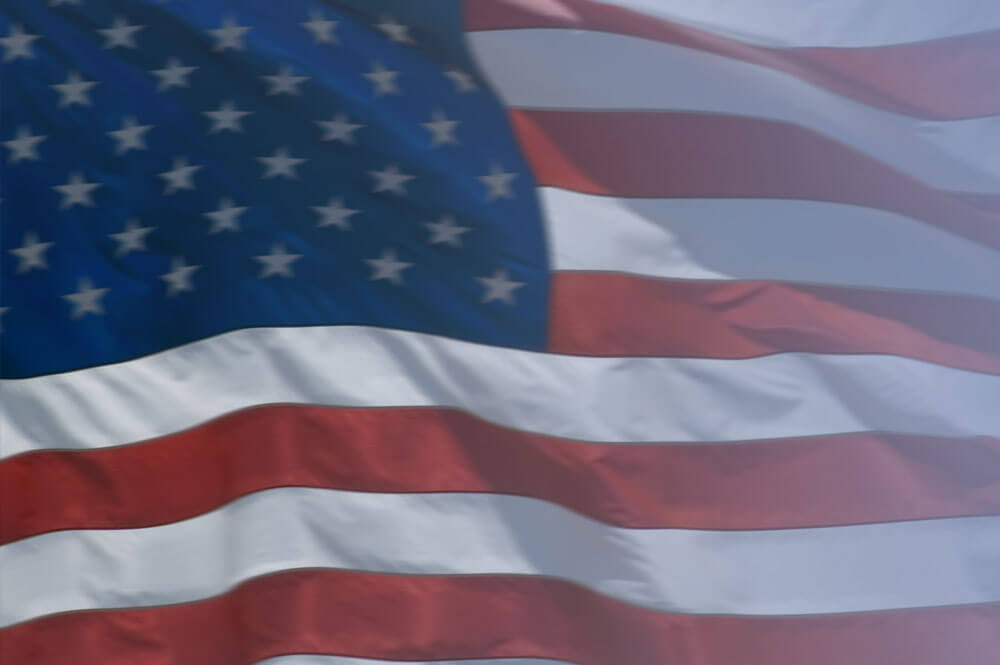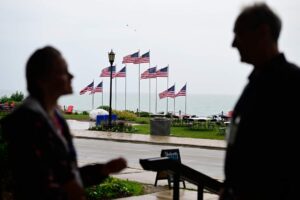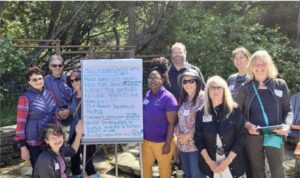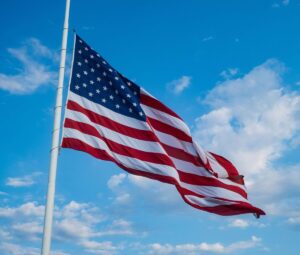Better Angels was born in response to the crisis of polarization—a growing crisis that hampers government, destroys trust, degrades public discussion, fosters isolation, and harms personal relationships. Polarization tears at our social fabric, as trust in our institutions reaches historic lows, distrust of one another on the basis of politics reaches all-time highs, and disturbing trends in race relations and in social and class friction point to increasing conflict.
From its beginning, Better Angels has stood for understanding other people’s point of view, even if we don’t agree with it. We have stood for the importance of working together despite our differences. We have stood for a love of country that demonstrates itself in the concern we bear for our fellow Americans. It is this patriotic empathy that will break the grip of divisiveness and strengthen our common bonds.
Proud of our origins, today we dedicate ourselves to the great task before us—to safeguard the spirit of our republic and to preserve its deepest unity. In our politics, let us work together when agreement is found and oppose one another in civility and good faith when it is not. In the work of Braver Angels, let us build trust between individuals and restore trust in our institutions. Let us labor together to discover and cherish our common heritage and identity as Americans. Let us strive as one for the “beloved community” of Reverend Dr. Martin Luther King Jr’s vision and the “more perfect Union” of the Founders’ summoning.
Theory of Change
A theory of change provides a guide to the key strategies and initiatives for achieving the progress we seek.
Reflect America
Critically, our theory of change requires us to reflect America. Thus, our rule of red/blue balance is foundational for all that we do. In our red/blue workshops and alliances, in our campus work, and at every level of leadership we are half red and half blue. Beyond reflecting the spectrum of political opinion, we must also strive to be inclusive in our membership and leadership of all walks and aspects of American life, so that our organization reflects the country we seek to serve.
Changing Our Hearts
Our focus is grassroots, citizen-to-citizen changing of hearts. It’s “We the People” depolarizing one another and it’s been Better Angels’ main focus and success to date. In this part of our work, we seek both to renew our trust in one another and build our civic muscle.
How much grassroots success is necessary for us to influence the nation as a whole? Probably the best answer is one percent. Research shows that one percent of the people in a community, if organized and motivated, can significantly influence that community. We estimate that, for Better Angels, the one percent tipping point is about 1.5 to 2 million involved and committed Americans. That’s our long-term goal. To reach it, we will set intermediate goals along the way, and in the next 12 months we will strive to develop new and online offerings to make the Better Angels experience available not just to thousands, but to millions of Americans each year.
Changing Institutions
Changing ourselves is fundamental, but to depolarize America, we must also change our institutions. Changing ourselves happens inside and between us as individuals. Changing institutions requires focusing on society’s guiding rules and structures. Braver Angels’ three institutional priorities are government, education, and media. Each requires its own approach.
Changing governmental institutions requires approaches such as Better Angels caucuses within state legislatures and policy proposals developed by local Better Angels Alliances. Better Angels Debates can influence culture and possibly influence practices in colleges and high schools, as can Better Angels skills workshops in college freshman orientation programs. Changing the media presents probably the greatest challenge, but through example and incentives, including establishing a prominent audience for non-partisan media, we hope to change this institution.
We can also state generally the type of institutional change we seek. Our concern is not with specific outcomes but with establishing that an institution’s rules, norms, and operating procedures create incentives for less polarization. To use the analogy of sports, we do not seek to determine who wins the game; we seek to change how the game is played. Imagine a hockey game where fights take up 95 percent of each time period. That is the unfortunate reality of many of our institutions today. We strive to reduce the fighting so that healthy, robust deliberation leads to better outcomes for our nation.
Thought Leadership
Just as the Federalist papers made the case for ratification of the Constitution, we must have key opinion leaders who make the case for depolarization.
We seek a virtuous cycle in which individuals help to change institutions and changed institutions in turn encourage more individual growth. Such a cycle can be initiated by leaders capable of defining and encouraging it. For Better Angels, that pump-priming occurs through our growing network of thought leaders, scholars, and researchers and in 2019, by establishing the Council for the Common Good.
Partnerships
Finally, we are not alone in seeking this change. Many other organizations are also trying to reduce polarization, increase civility, and change the rules and norms of our institutions. Where it makes sense, we will collaborate and partner with organizations that share our vision and mission.
Priorities and New Initiatives
At our Founding Convention in Harrisonburg, Virginia, in June of 2018, delegates adopted “An American Declaration” stating our call to the nation and “Principles and Program” offering guidelines and recommendations in the areas of citizen mobilization, media, scholarship, and public policy. To advance and build upon those founding ideas, today we adopt three priorities for new and further-developed Better Angels initiatives in the next 12 months.
Media Initiative
A 2019-2020 research and exploratory initiative will test strategies to reduce partisanship and polarization in the media — traditional, digital, and social — and to foster a humanizing alternative. The effort will build upon existing campaigns under the umbrella of Better Angels Media.
The initiative will work to create depolarized media, challenge media polarizers, and promote the work of Better Angels.
Possible strategies include the creation, dissemination, and on-going monitoring of a voluntary Media Code of Ethics; organizing Better Angels members and other consumers of media to take local action to support depolarizing media content; creating new media programming to model depolarization; and enlisting leading red and blue media personalities to model and publicly support depolarizing media content.
This initiative will be coordinated by two Better Angels leaders, one red and blue, selected by the Better Angels board of directors. A report on the initiative, including measurements of success and recommendations for next steps, will be submitted to the 2020 Better Angels Convention.
Public Policy Initiative
A 2019-2020 pilot project involving the creation of Alliance Policy Groups will test our ability to bring together interested red and blue Better Angels members at the local level and in equal numbers to examine and in some cases develop and propose public policies. The desired outcome is to demonstrate that Better Angels members at the local level can work together across party and philosophical lines to offer constructive proposals.
Each local Alliance Policy Group participating in the initiative chooses and develops its own proposal. The resulting proposals as a group will therefore be diverse and, as regards content, not necessarily in agreement with one another. Nor will the content of the proposals be specified or directed by the national organization, which does not and will not take policy positions.
This pluralistic, local approach to policy discussion and development is intended to encourage local innovation, respect the reality and importance of viewpoint diversity in a free society, and model for our elected officials in both parties and in all levels of government a process of respectful, fair-minded collaboration that they might profitably learn from and seek to imitate.
The project will operate according to five basic guidelines.
- Participation is optional for all Alliances and all Better Angels members.
- Alliance Policy Groups are created by and accountable to local Better Angels Alliances.
- The composition of each local Policy Group will follow the Better Angels Rule of half red and half blue participants.
- To be adopted by a Better Angels Alliance, a proposal emerging from a Policy Group must be endorsed by at least 75 percent of the Alliance’s dues-paying red members and 75 percent of its dues-paying blue members.
- Better Angels as a national organization does not and will not develop, endorse, oppose, or comment on matters of public policy.
The pilot project will be coordinated by two Better Angels leaders, one red and one blue, selected by the Better Angels board of directors. A report on the pilot project, including measurements of success and recommendations for next steps, will be submitted to the 2020 Better Angels Convention.
Partnerships Initiative
Over the next 12 months, Better Angels will actively explore partnerships with other organizations. We seek mutually beneficial partnerships in order to reach more Americans, be better stewards of our resources, learn from and assist organizations who share our mission, and accelerate our nation’s overall progress toward depolarization.
In considering whether and under what conditions to propose or agree to partnering, Better Angels will consider, among other relevant factors, the following:
- Will the partnership be mutually beneficial?
- Will the benefits of this partnership outweigh its costs?
- Does Better Angels have the resources to manage the partnership effectively?
- Will the prospective partnership help Better Angels achieve its goals of red-blue balance and reflecting America? How balanced and representative is the prospective partner itself?
- Will the partnership build goodwill and better friendship?
- Does the prospective partner share our values and vision?
- Is the partnership supportive of the 2019 Better Angels Platform?
Pending answers to these questions, this initiative will explore and, in some cases, test various forms of partnership, at the local and national level, which are presented below in ascending order of complexity and breadth.
- Organizations proposing or agreeing to bring Better Angels programs to their members.
- Organizations proposing or agreeing to partner with local Alliances for projects or events.
- Organizations proposing or agreeing to trade favors with us (for example, each group promoting the other on its website or via email to its members).
- Organizations seeking our agreement to join their organization or network.
- Organizations proposing or formally agreeing to combine or merge some or all of their programming with ours.
The fifth and closest form of partnership — “organizations proposing or agreeing formally to combine or merge some or all of their programming with ours”— must and can only occur according to actions taken by the Better Angels board of directors.
The procedures for review of local partnerships will be developed promptly after the Convention.
This initiative will be coordinated by the president of Better Angels and by two Better Angels leaders, one red and one blue, selected by the Braver Angels board of directors. A report on the initiative, including measurements of success and recommendations for next steps, will be submitted to the 2020 Better Angels Convention.




